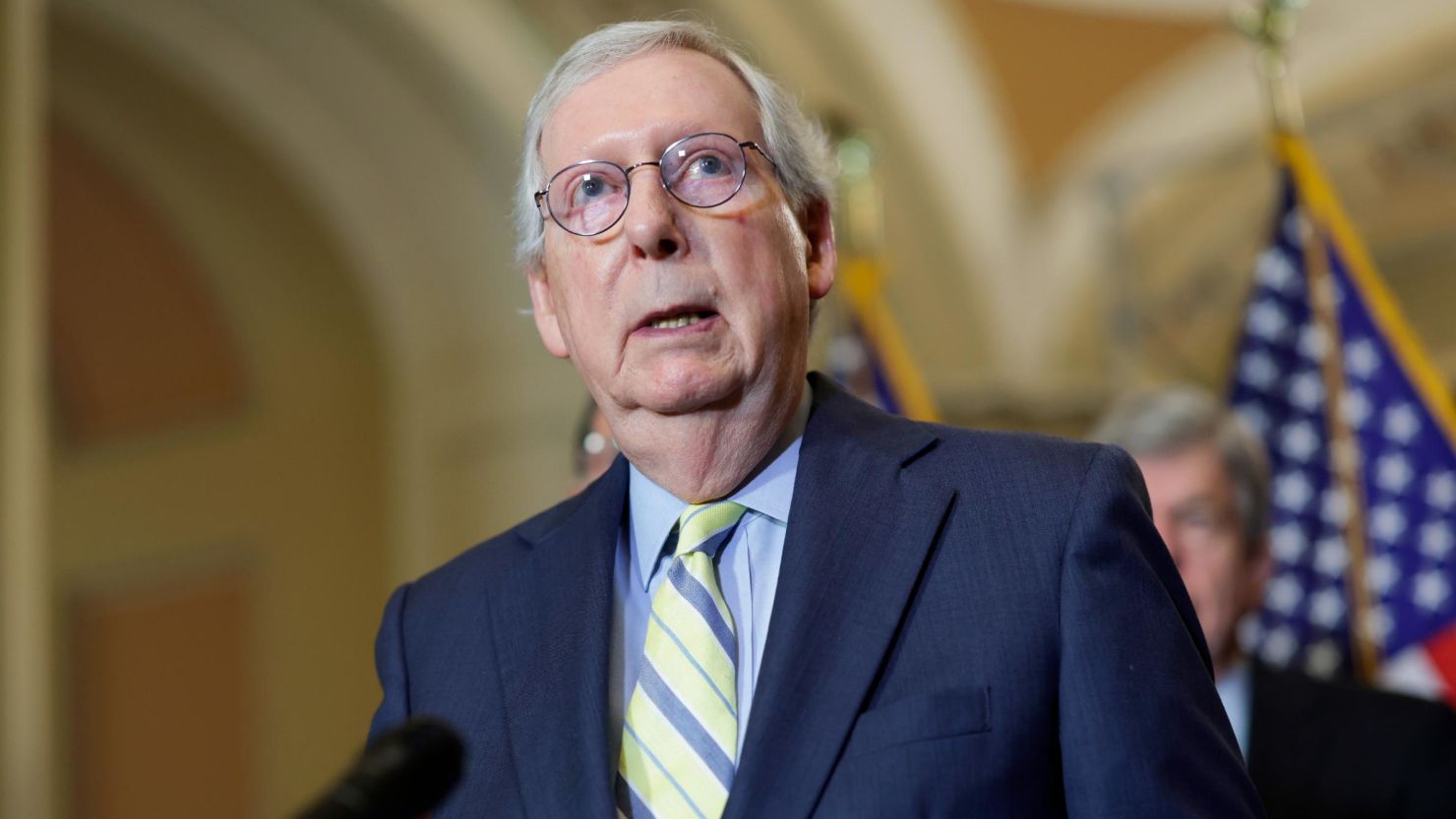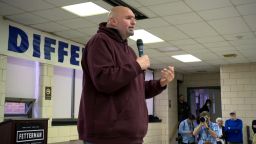A super PAC tied to Senate Minority Leader Mitch McConnell came to the rescue of J.D. Vance, the struggling Senate Republican candidate in Ohio, a state Democrat Joe Biden lost by 8 points in 2020.
The National Republican Senatorial Committee resorted to cutting and shifting ad spending to preserve resources, as many of their candidates trail their Senate Democratic opponents in fundraising. And election forecasters altered their view of a crucial contest in Pennsylvania in favor of Democrats.
With fewer than 100 days from the November midterm elections, Senate Democrats found a few signs of promise in a bleak political environment this week, even as their House counterparts privately acknowledged they are likely to lose the chamber. Republicans need to flip just one net seat to recapture the Senate, and five seats to take the House.
McConnell on Thursday predicted the 2022 elections will deliver an “extremely close” Senate, with “either our side up slightly or their side up slightly.”
“I think there’s probably a greater likelihood the House flips than the Senate,” he said, at a Northern Kentucky Chamber of Commerce luncheon in Florence, Kentucky.
“Senate races are just different. They’re statewide,” he added. “Candidate quality has a lot to do with the outcome.”
Democrats involved in Senate races argue that the Republican nominees in states like Arizona, Pennsylvania and Georgia are deeply flawed candidates that will struggle to connect to general election voters.
That extends to Ohio, where Vance, the “Hillbilly Elegy” author, is neck-and-neck with Democratic Rep. Tim Ryan despite the red-leaning nature of his state. The Senate Leadership Fund announced Thursday it is reserving $28 million in ads starting on September 6 to boost Vance. After the Supreme Court knocked down the constitutional right to an abortion, Ryan has pressed Vance on his opposition to it. (Vance has also drawn controversy lately over his statements suggesting that women in even “violent” marriages should stay in them for their children’s benefit.)
The nonpartisan Cook Political Report also moved Thursday the open Pennsylvania Senate race from the “toss up” column to the “lean Democratic” category. Dr. Mehmet Oz is competing against Lt. Gov. John Fetterman in what is seen as one of the Democrats’ best pick-up opportunities this cycle.
Like many other Senate GOP candidates, Vance and Oz have been out-raised by their Democratic opponents, and relied upon outside groups to make up the gap. In fact, Blake Masters in Arizona, Herschel Walker in Georgia, Rep. Ted Budd in North Carolina, Adam Laxalt in Nevada, Florida Sen. Marco Rubio, Joe O’Dea in Colorado, and the New Hampshire GOP candidates have all been beaten by Democrats in the money race.
Democrats, meanwhile, have benefited from a recent burst of legislative activity, including signing a sweeping bill to lower prescription drug prices and carbon emissions into law. And inflation – Americans’ top concern – may be finally cooling.
Still, Democrats are facing stiff political headwinds this fall. The party in power historically loses seats in the first midterm elections, and President Joe Biden’s approval ratings hovers near 40 percent.
“Democrat incumbents have supported Joe Biden and his disastrous agenda 100% of the time while Democrat challengers have embraced radical positions like defunding the police and banning fracking,” said Chris Hartline, spokesman for the NRSC. “Voters are about to hear a lot more about it.”
The Cook Political Report also shifted on Thursday the Senate Colorado race from “likely” to “lean” Democrat, as Republicans say O’Dea has a real shot in defeating Democratic Sen. Michael Bennet in the state Biden won by over 13 points in 2020.
Democrats are hopeful that a combination of factors – including their record of legislative accomplishments, the improving economic picture, flawed GOP candidates, the overturning of Roe v. Wade, and the swirling investigations around Trump – will help buoy them in an otherwise tough election year.
Christie Roberts, the Democratic Senatorial Campaign Committee executive director, recently wrote, “We know each of our battleground races will be tight, and the DSCC will continue to take nothing for granted.”
McConnell has said the GOP must work to appeal to moderates and women in the suburbs. He and a faction of Senate Republicans voted for bipartisan bills to boost infrastructure, improve gun safety and make the US more competitive with China, while addressing the global chip shortage.
“No matter who’s up and who’s down, try to find ways to make some progress for the country. And I think we’ve done that with infrastructure. I think we did it with postal reform. I think we did it with school safety and mental health. And I think we did it with” the chips bill, McConnell said. “I can’t think of an administration with which had more differences than this one. But even in that atmosphere, we found a way to make some progress for the country.”
McConnell’s comments Thursday about the likelihood of a tough fight this fall were notably less bullish than those made by other Republican leaders, who have pointed to Biden’s low approval ratings and historic trends showing losses for the president’s party in the first midterms following their election.
But even needing just one pickup to retake control of the US Senate, Republican prospects have dimmed slightly after a summer of nominating contests. Bruising primary campaigns, lackluster fundraising, and inexperienced candidates have bedeviled the party, which McConnell alluded to in his remark about “candidate quality.”
In Georgia, Walker has stumbled through a series of high-profile gaffes while his opponent, Democratic Sen. Raphael Warnock, has blasted him with attack ads, powered by blockbuster fundraising. In Pennsylvania, Oz, a first-time candidate, largely ceded the airwaves over the summer to Democratic opponent Fetterman while going viral online for campaign trail flubs that seemed to bolster his opponent’s carpetbagger accusations.
Republican National Committee chairwoman Ronna McDaniel also seemed to acknowledge Republicans’ difficulty in Senate races, noting in a Fox interview earlier this month that “Democrats have had a huge fundraising advantage on the Senate candidates,” and urging supporters to contribute to battleground candidates.
GOP spending groups have engaged early to help pick up the slack, with party organizations like the NRSC and outside groups like the One Nation already spending tens of millions on ads attacking Democrats and boosting Republicans. Meanwhile, Senate Leadership Fund, a major super PAC, has $150 million in airtime booked for the coming fall months.
CNN’s Ali Zaslav contributed to this report.





